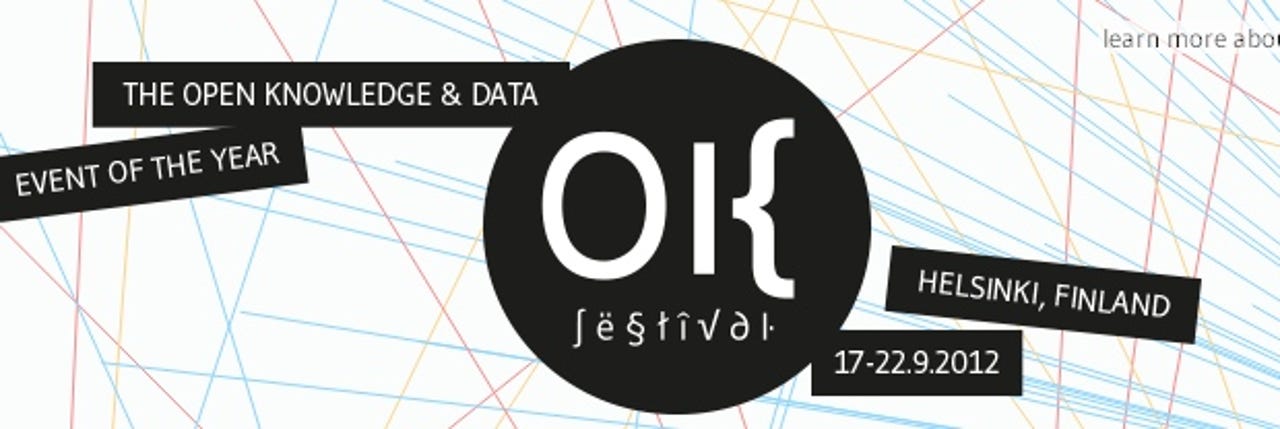Open data: Is there a business case?

I'm up in Helsinki at the Open Knowledge Festival (which, tempting fate, uses the abbreviation 'OK Festival'). It's an interesting event, even if it does occasionally lapse into the quasi-religious atmosphere that often accompanies 'open' tech issues.
Thankfully, there are those willing to ask heretical questions. Some of the most valuable discussions took place this afternoon, covering the thorny issue of open data's business case. Yes, many can easily agree that open is good, but how can it benefit the bottom line?

According to Ville Peltola, IBM's innovation chief here in Finland, that's a question that just won't go away.
"It's beginning to frustrate me a bit," Peltola said. Telcos, for example, have tons of data around traffic (the vehicular kind) due to the real-time phone tracking they implement. Some operators sell that data, but why not open it up properly?
Or perhaps, Peltola theorised, just open some of it up. "You could have bronze, silver and gold APIs, where more data costs more," he suggested. "It's like a drug dealer. Maybe you have to solve this chicken-and-egg problem by giving samples of raw data."
Then, when the company sees the innovation that its open data spurs, it can figure out the business benefits. Or something like that.
A bit fuzzy, yes. But it does take into account one of the key points here: that large amounts of data are very valuable, and the companies that create them tend not to know how to realise the greatest value from them. And that someone else might be able to figure out that piece of the puzzle.
Where's the money?
Chris Taggart is a co-founder of OpenCorporates. His company takes all sorts of openly-available corporate information — from sources such as company registers and public filings around the world — and puts it all in a unified repository, which has its own API.
"We're for-profit," Taggart said. "If open data is just a niche, then it won't succeed and spread across the world."
"If open data is just a niche, then it won't succeed and spread across the world" — Chris Taggart, OpenCorporates
As Taggart notes, "open source works because there are businesses dependent on open source". Similarly, there's a lot of business to be built around open data. OpenCorporates, for example, offers services such as cleaning up and reconciling company data from those multiple sources, and also has a dual-licensing model (share-alike for free, not-share-alike for money). Taggart hasn't had to tout for business — companies are coming to him, he says.
But he's the beneficiary, not the benefactor. So why does he think companies should throw their data out there?
"It's turbo-charging your assets," he claimed. "It solves collective action problems — there is cooperation to be gained [without which] you would have to form a cartel to solve [those problems]."
That point was intriguing, though I was less convinced by his argument that "it forces you to be a business that adds value rather than a rent-seeking one". A noble stance, for sure, but if anything a reason for a happily rent-seeking business not to open up.
Why not?
The best argument I heard from Taggart was that opening up your data "exposes your competitors' internal contradictions".
If your company is a market leader, there will probably be little incentive to provide truly open data. Many such companies would probably feel that they may be giving away their competitive edge by doing so. But if you are in the number two or number three spot in your market, you have much less to lose.
"If [you open your data] you can change the rules to expose your competitor's internal contradictions," Taggart said. "Most big, fat secure companies don't have the confidence to disrupt themselves."
In effect, at the very least you might make your competitor look bad. And maybe, just maybe, you'll stimulate disruption that you can be first in line to capitalise upon.
IBM's Peltola had his own spin on that idea. "It's about taking risks," he said. "What if you have an internal start-up in your company tasked only with monetising your data?"
No easy answers
Peltola and Taggart weren't the only ones addressing the issue of open data's business case.
Simon Redfern, to name another, is behind the Open Bank Project. He's trying to convince banks that they should make it possible for their customers to securely expose their bank accounts to selected individuals or organisations, so individuals could show their finances directly to their accountants, and NGOs could have a way to demonstrate ultimate accountability to their funders.
"What's in it for a bank to become more open?" he asked, reasonably. "Forty-nine percent of people in Europe are unhappy with their online banking experience. [We're promoting] transparency as an asset."
That really sums up the open data conundrum. There are so many new services to be devised, and there is so much competitive advantage to be gained by getting in there first.
But for many companies — certainly those at the top of their game — it's a huge risk to take. This chicken-and-egg problem is nowhere near solved.